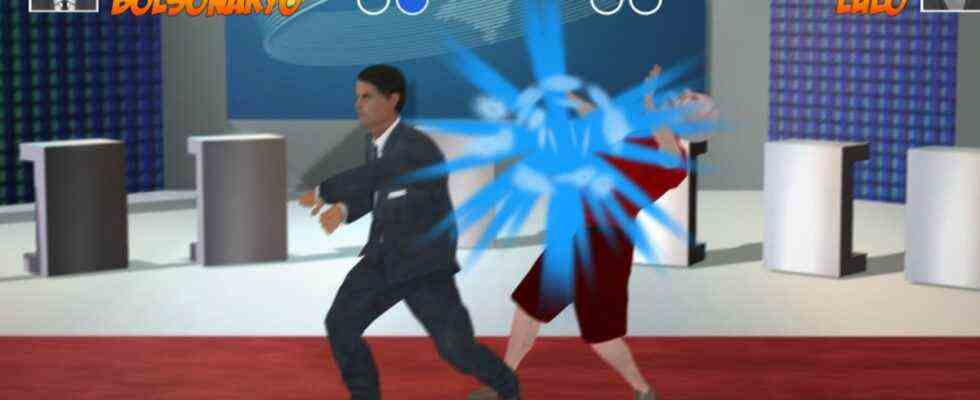smack! The first slap sits straight away. “Bunker!” Jair Bolsonaro shouts, eyes widening in anger. But before he can continue yelling, the next swatter comes. And then another. bang! boom!
Welcome to “Bozonaro”, a smartphone game that uses so-called “extended virtuality” to beam a digital image of Brazil’s president into a normal living room or even onto the kitchen table – just so that the cell phone owners can either beat him up on the display or with him can throw oranges. “Incredible!”, One user writes enthusiastically online, “best game ever made”, another user.
In any case, Bozonaro has allegedly been downloaded more than 50,000 times, which in turn raises the question of what all this says about Brazil. Especially when you consider that “Bozonaro” is far from the only game in which you can currently beat up top Brazilian politicians.
In “Derrube o Jair” (in German as much as “Shoot Jair”) you can throw eggs at the head of state. With “Bolsomito”, on the other hand, you have to switch sides and help the president beat up his opponents: cheeky parliamentarians and the opposition, but also criminals, blacks, gays or left-wing demonstrators. “Help save the nation from misery!” the developers write on the game’s official website.
Hardly any other country is as digitized as Brazil
“Bolsomito” comes from the time of the last election campaign in 2018, a classic, so to speak. At the time, the game caused a lot of excitement because of its political incorrectness, but also because of its success. Now elections are taking place again in the fall, and this time, experts believe, the games will not only be a fringe phenomenon, but a big trend, buzzword “gamification”.
One reason for this is, first of all, the enthusiasm for technology among many Brazilians: There are still regions in the giant country that are cut off from any Internet connection because they are too remote or simply too poor to be of interest to communications companies. On the other hand, there is hardly a country in South America that is as digitized as Brazil: Banking is of course done online, and even the smallest beach kiosk has a Whatsapp account.
There have long been more smartphones in the country than Brazil has inhabitants, and people spend an average of more than five hours a day in front of the displays. They write messages, check social media – and of course they play in every imaginable form: freeing princesses, arranging gems, racing. Some fight epic cell phone battles on the subway commute, while others engage in political battles.
In the heated political mood, games are a way to relieve stress. The elections in October are still more than six months away, and not even all the candidates have officially been chosen. In all probability, however, Jair Bolsonaro will compete against his pre-pre-predecessor, Luiz Inácio Lula da Silva from the Workers’ Party, that is: incumbent president against ex-head of state, right against left or, to stick with the jargon: final boss against final boss. Brazil is deeply divided, fisticuffs at demonstrations and attacks on journalists are the order of the day, groups of friends and families are at loggerheads because one is pro-Lula and the other is a convinced Bolsonarista. Gambling therefore also serves as an outlet: “Politicos Memes Kombat” is the name of a popular game in which politicians hit each other with full force.
The hit-and-run games are still mainly from small, independent developers who have little experience in app development, which is also noticeable in the graphic implementation and in the technology. Established suppliers, on the other hand, are reticent. So far, Brazilian politicians have also refrained from launching their own games and inciting their own supporters to hit the opposing candidate, even if only virtually. Nobody wanted to go that far before.
And yet, of course, the politicians have long known about the voting potential of gamers. And so Jair Bolsonaro has long since changed his mind when it comes to the games: ten years ago he described them as “crimes”, in the previous election campaign he showed himself gambling. And as soon as he was in office, he lowered taxes on consoles and games three times, from 50 percent to just 20 percent.
Bolsonaro will not have done this without ulterior motives. He should hope for the votes of gamers. Because in the end he also knows: A slap in the face in the virtual world is one thing – but a slap in the elections is something completely different.

